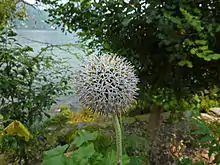Echinops exaltatus
Echinops exaltatus, the Russian globe thistle or tall globethistle,[2] is European species of globe thistle in the sunflower family. It is native to central and eastern Europe from Germany and Italy east into Russia.[3] The species has escaped cultivation and become established in the wild in scattered locations in eastern Canada and the northern United States.[4]
| Echinops exaltatus | |
|---|---|
 | |
| Scientific classification | |
| Kingdom: | Plantae |
| Clade: | Tracheophytes |
| Clade: | Angiosperms |
| Clade: | Eudicots |
| Clade: | Asterids |
| Order: | Asterales |
| Family: | Asteraceae |
| Genus: | Echinops |
| Species: | E. exaltatus |
| Binomial name | |
| Echinops exaltatus Schrad. 1818 not Koch 1843 | |
| Synonyms[1] | |
| |
Echinops exaltatus is the largest of all globe thistles, a branching perennial herb up to 150 cm (60 inches or 5 feet) tall. One plant can produces several flower heads, each with a very nearly spherical array of white or pale blue disc florets but no ray florets.[2]
See also
- Salsola soda – Species of plant – Also known as oppositeleaf Russian thistle.
- Kali tragus – Also known as Prickly Russian thistle.
- Salsola
- Tumbleweed – An anatomical structure of certain plants that detaches and rolls in the wind.
References
- The Plant List Echinops exaltatus Schrad.
- Flora of North America, Tall globe-thistle, boulette de Hongrie, Echinops exaltatus Schrader, Hort. Gott. 2: 15, plate 9. 1811.
- Altervista Flora Italiana, Cardo pallottola semplice, drüsenlose Kugeldistel, grå bolltistel, Echinops exaltatus Schrad.
- Biota of North America Program 2014 county distribution map
This article is issued from Wikipedia. The text is licensed under Creative Commons - Attribution - Sharealike. Additional terms may apply for the media files.